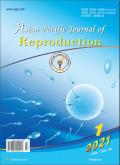Effect of royal jelly on in vitro fertilization and early embryo development following nicotine treatment in adult female rats
IF 0.6
Q4 REPRODUCTIVE BIOLOGY
引用次数: 2
Abstract
Objective: To scrutinize the protective role of royal jelly as an antioxidant on nicotine-induced changes in malondialdehyde (MDA) level, p53 expression, in vitro fertilization (IVF) rate, and early embryo development in adult female rats. Methods: A total of 56 adult female Wistar rats were divided into 8 groups (n=7 in each group). Group 1 served as an untreated control group, group 2, 3 and 4 received nicotine at a dose of 0.50, 1.00 and 2.00 mg/kg respectively, group 5 received royal jelly at a dose of 100.00 mg/kg, and group 6, 7 and 8 received 0.50, 1.00 and 2.00 mg/kg nicotine, respectively, with 100.00 mg/kg body weight royal jelly. Nicotine and royal jelly were administered daily for 49 days in the experimental groups intra-peritoneally and orally, respectively. At the end of the experimental period, p53 expression, IVF rate and early embryo development as well as MDA concentration were measured. Results: The IVF rate, number of cumulus oocytes, two-cell embryos and blastocysts decreased in the nicotine-treated groups in a dose-dependent manner. In addition, p53 mRNA expression and MDA levels increased in the nicotine-treated groups. Royal jelly co-administration led to partial improvement in the aforementioned parameters. Conclusions: Royal jelly may have a repro-protective effect in nicotine-administered female rats in terms of its anti-oxidant and anti-apoptotic properties.蜂王浆对成年雌性大鼠尼古丁处理后体外受精和早期胚胎发育的影响
目的:探讨蜂王浆作为抗氧化剂对尼古丁诱导的成年雌性大鼠丙二醛(MDA)水平、p53表达、体外受精(IVF)率和早期胚胎发育的保护作用。方法:取成年雌性Wistar大鼠56只,随机分为8组,每组7只。第1组为未处理对照组,第2、3、4组分别给予0.50、1.00、2.00 mg/kg剂量的尼古丁,第5组给予100.00 mg/kg剂量的蜂王浆,第6、7、8组分别给予0.50、1.00、2.00 mg/kg剂量的尼古丁,蜂王浆为100.00 mg/kg体重。试验组每日给予尼古丁和蜂王浆腹腔注射和口服,连续49天。实验结束时,检测p53表达、体外受精率、早期胚胎发育及MDA浓度。结果:尼古丁处理组体外受精率、卵丘细胞数、双细胞胚胎数和囊胚数均呈剂量依赖性降低。此外,尼古丁处理组p53 mRNA表达和MDA水平升高。蜂王浆共同给药导致上述参数的部分改善。结论:蜂王浆具有抗氧化和抗细胞凋亡的作用,对尼古丁给药的雌性大鼠具有再生保护作用。
本文章由计算机程序翻译,如有差异,请以英文原文为准。
求助全文
约1分钟内获得全文
求助全文
来源期刊

Asian Pacific Journal of Reproduction
Veterinary-Veterinary (all)
CiteScore
1.70
自引率
0.00%
发文量
588
审稿时长
9 weeks
期刊介绍:
The journal will cover technical and clinical studies related to health, ethical and social issues in field of Gynecology and Obstetrics. Articles with clinical interest and implications will be given preference.
 求助内容:
求助内容: 应助结果提醒方式:
应助结果提醒方式:


